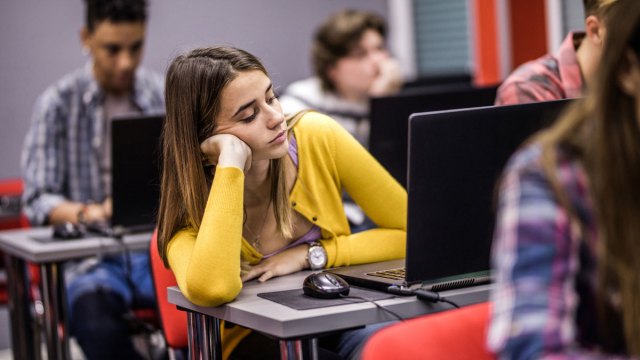We all remember what it felt like to be a sleepy teenager—the alarm always seemed to go off too early, and it could take hours to shake off the sleepiness that lingered through the first few class periods of the day.
Though some parents might be quick to write their teens off as lazy, this sleepiness isn’t their fault. It actually can often stem from early school start times for many who struggle. While adults might be well-suited for earlier wake-up calls, teenagers’ circadian rhythms—the light-mediated internal cues that help regulate sleep—are wired in a way that leaves teenagers sleepy in the morning and more awake at night. This is perfectly normal; our circadian rhythm changes throughout our lives, and unfortunately, school schedules just aren’t planned around ensuring our teens get the sleep they need.
In fact, teenagers’ body clocks are best synced to bedtimes around 11 p.m. or midnight, with a wakeup time around nine hours later. With some schools starting classes as early as 7:30 in the morning, and students needing time to get ready and get to school, it’s no wonder teens are so sleepy.
From a sleep perspective, teenagers would benefit most from school start times that begin no earlier than 8:30 a.m. This shift would mitigate the dreadful side effects of sleep deprivation teenagers face and overall improve teenagers’ mental and physical health.
States that have tested later school start times have seen promising results. A 2020 JAMA study followed five school districts in Minnesota from 2016 to 2019. In 2016, all five schools followed a baseline start time of 7:30 a.m., but between 2017 and 2019, two schools pushed their start times back by 55 minutes or a full hour, while three continued operating with early start times. At the end of the study, the researchers found that the kids who started school later got an average of 43 more minutes of sleep per night than their early-bird counterparts.
Further evidence suggests it can lead to improved academic outcomes. Plus, another 2020 study found an association between later school start times and a decrease in teen driving accidents.
The concept might be catching on nationwide. Beginning in July 2022, California became the first to mandate that middle and high schools can start no earlier than 8 or 8:30 a.m., respectively, and New Jersey, Alaska, New York, and Tennessee have all considered following suit.
Related: Tips for Starting (& Keeping) a Successful Bedtime Routine
The idea is also gaining support among teachers, who see first-hand the repercussions lack of sleep can have on teens. “About half of my middle school kids can barely stay awake the first two periods of the day,” teacher Melissa Rowe told Sleepopolis in a June interview. “As for high school, I literally have students who fall asleep on the floor in my classroom.”
Of course, every middle and high school across the country isn’t going to be able to make this shift overnight. Luckily, there are some ways parents can help their teenagers get the best night’s sleep they can. If you think your teenager is sleep deprived, try these tips to get them back on track:
- Encourage proper sleep hygiene as often as possible.
- Set a regular bedtime and rise time, including on weekends to maintain a schedule.
- Dim both room and electronic lighting to reduce exposure to bright lights before bed.
- Encourage sleepiness.
- Consider eliminating technology use after a certain time before bed, and remove it from the bedroom.
It’s important to remember that teenagers should never be forced to choose between sleep and something else. Teens often find themselves in the position of choosing between sleep, sports, and homework, and doing all three can seem impossible. Keep an open dialogue and help them balance the workload coming their way without sacrificing sleep. Think about where overscheduling is an issue and where you can cut back to allow enough time for sleep.
Sleep is vital to a teenager’s health and happiness. Early start times are a real obstacle to adequate rest for teenagers and their differently wired circadian rhythms, but there are roadblocks that parents, health care providers, school administrators, and educators could overcome if we all worked together. And for the sake of our teens’ health, it’s imperative that we give it a try.
Dr. Shelby Harris is the Director of Sleep Health at Sleepopolis. As a licensed clinical psychologist specializing in behavioral sleep medicine, she treats a wide variety of sleep disorders, including insomnia, nightmares, and narcolepsy, with a focus on non-pharmacological interventions. She is board-certified in behavioral sleep medicine by the American Academy of Sleep Medicine and the author of The Women’s Guide to Overcoming Insomnia: Get a Good Night’s Sleep Without Relying on Medication.











